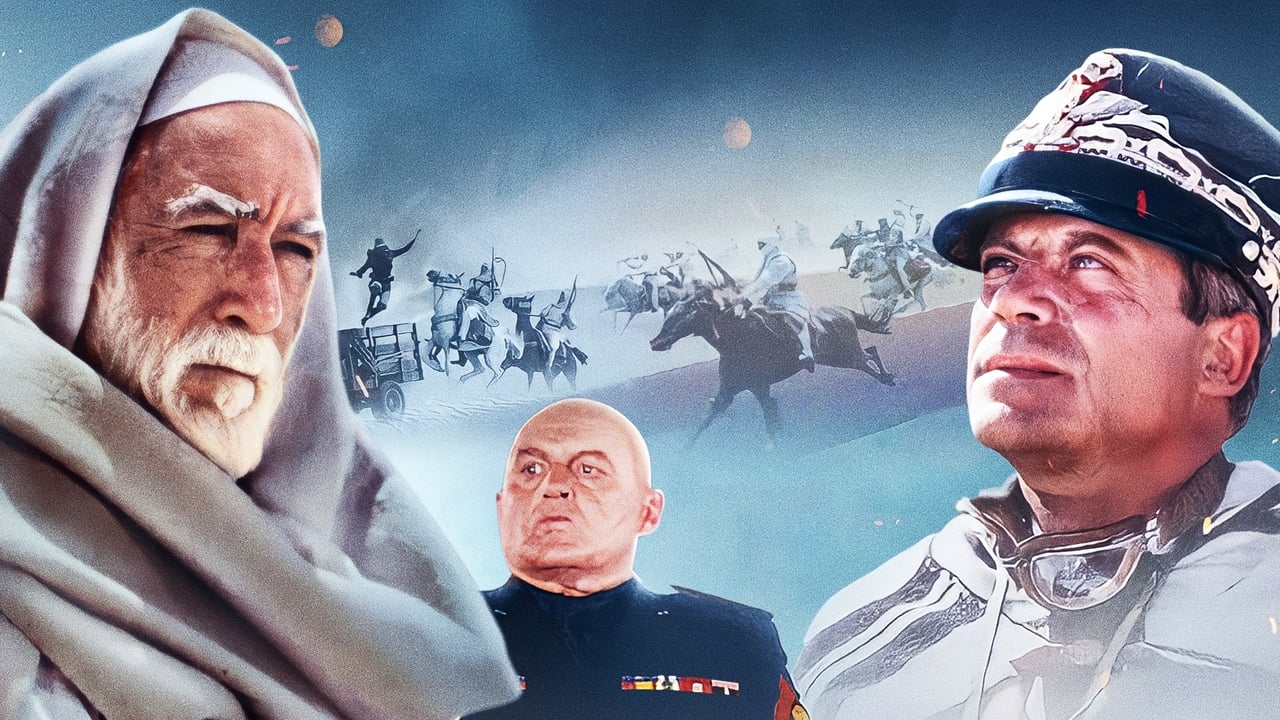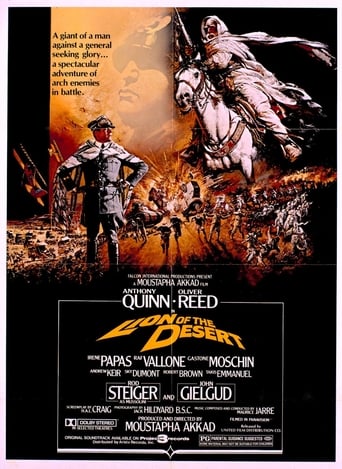Solidrariol
Am I Missing Something?
Matrixiole
Simple and well acted, it has tension enough to knot the stomach.
Connianatu
How wonderful it is to see this fine actress carry a film and carry it so beautifully.
Cassandra
Story: It's very simple but honestly that is fine.
oscar-35
*Spoiler/plot- Lion in the desert, 1981. After WW1, Facsist Italian government wishes to colonize North Africa in Libya to reproduce the Roman empire. The Bedouins fight this invasion and colonization for over 20+ years but the same Moslem leader. Finally the Muslim leader is captured and hanged.*Special Stars- Anthony Quinn, Oliver Reed, Rod Steiger, Irene Papas, John Geilgud.*Theme- The native people will fight dictators to the end.*Trivia/location/goofs- Filmed in Libya. Bankrolled by Muammar Gadfi and Govt assistance with troops was accomplished. One of the biggest disasters in film box office history, costs 35$ million only recovered 1$ million. 200,00 Bedouins were historically killed in this Facsist Italian war campaign. Maybe a bid idea if you're superstitious: This 1981 film was made and released on the 50th Anniversary of the execution by hanging of Omar Mukhtar who died in 1931. Extremely accurate military uniforms.*Emotion- While trying to reproduce the success of 'Lawrence of Arabia' with some of the same production heads, this film only succeeds in being a shabby 'knock-off'. The story line and script is provincial, boring, and shabby. The costumes and lead cast are quite good. The film is too slow in pacing and very predictable, especially for viewers who know little about this event in history. Except for some small scenes with fine acting sprinkled through this epic story, this film is a snore and a bomb. A brilliant failure on film.
Ishallwearpurple
Lion Of The Desert (1981) Anthony Quinn, Oliver Reed, Raf Vallone, Rod Steiger. A wonderful performance by Quinn as Omar Mukhtar, the Lion of Libya. And Reed as Italian Gen.Rodolfo Graziani, who pursues him for Benito Mussolini. The time it takes - from 1911 to 1931 - is shown as the reason for the tribesmens' hatred of all foreigners. European countries carved up north Africa among themselves. Very effective use of the desert landscapes and using some actual newsreel footage of the refugee camps that stretch for miles. by the end. Some of the Italian officers were tried as war criminals. Interesting, and some great action scenes. 8/10
vernetto
The movie, although not a masterpiece, is quite realistic and historically accurate, actually it shows only a very small part of the ruthless brutality used by General Graziani against the civilian population. Some 120.000 civilians were killed in concentration camps in the attempt to quench the resistance. Graziani served only 2 years imprisonment for his crimes after the fall of Fascism, and later became honorary president of the (legal) neo-fascist party. This movie is still banned in Italy, and still recently the Italian Secret Services have prevented its official projection. The majority of Italians, even the anti-fascists, are still persuaded that our troops went to Lybia to build roads hospitals and bridges. It should not surprise that recently the former Prime Minister Berlusconi said that Mussolini never did any harm to anybody - probably not considering some hundred thousands Lybians casualties. Italians love to imagine their soldiers fraternizing with the locals and helping farmers in the fields - sadly the reality of war is quite different.
BaronStein
From the first time I saw this movie I thought it great. It is refreshing to see an historical movie done accurately and yet prove entertaining. I thought it was the finest performance ever given by Anthony Quinn. A couple of years ago I saw an interview with Quinn in which he said that it was the role he was proudest of and he was right about it.It's not really amazing though that the such a great film was a commercial failure in the US certainly. One only has to recall the line about the right of settlers (Italian) "not one minute of right, to the pasture not one cow" to see the parallel drawn to events in a country some 1000 mile or so to the east. Italian justification of their occupation based on a two thousand year old pedigree got to the nub of today's headlines in the middle east.Lybia, the 'Berber Kingdom', has a long history. It has been part of the civilized world and great empires dating back to Carthage and including Greeks, Romans, Moors, etc. For those interested in music they have the chance to see how 'bagpipes' were and are played from where they came. Early on the movie, when the young men return to the village, their dance is accompanied by bagpipes.Omar's last words are brilliant and haunting: "As for me, I will live longer than my hangman". One of the militias in Lebanon, during its civil war, was called the 'Omar Mukhtar brigade'.

